(完整word)一般疑问句(三年级)
(完整word版)外研版小学英语语法总复习知识点归纳

(完整word版)外研版小学英语语法总复习知识点归纳外研版小学英语语法总复知识点归纳一、时态1.一般现在时(1)表示经常发生的动作或事情,通常用“usually通常,often常常,every…每…。
sometimes有时,always总是,”等词。
(2)基本结构:主语I / You / We / They /He / She / It肯定句:主语+动词原形或动词第三人称单数形式否定句:主语+don’t + 动词原形或者doesn’t + 动原一般疑问句(Yes/No) Do…。
Yes。
I do.No,I don’t.Does…(动词原形)…?Yes,he/she does。
No,he/she doesn’t.特殊疑问句What do …。
How does she…(动词原形)…?(3)动词第三人称单数方式(同名词单数酿成复数办法不异)1.普通情形+s如:walk-walks2.辅音字母+y结尾去y +ies fly-flies3.结尾是s。
x,sh。
ch +es watch-watches4.结尾是0 +es do-does。
go-goes5.特殊have-has2.现在进行时(1)表示正在发生的动作,通常用“now现在。
look看,XXX听”.(2)根本方式: be +动词-ingeg: I am(not) XXX.You/We/They are(not) reading。
He/She/It is(not) eating.What are you doing。
Is he reading?(3)动词的目前分词方式(动词+ing)普通情形+ing walk—walking末端是不发音的e-e+ingcome—coming重读闭音节双写末了一个字母+ingswim-swimming。
run-running3.一般过去时(1)表示过去已经发生的事情,通常用“last …上一个…。
just now刚才,many years ago许多年前,XXX昨天”等词。
(完整word版)英语一般疑问句和回答
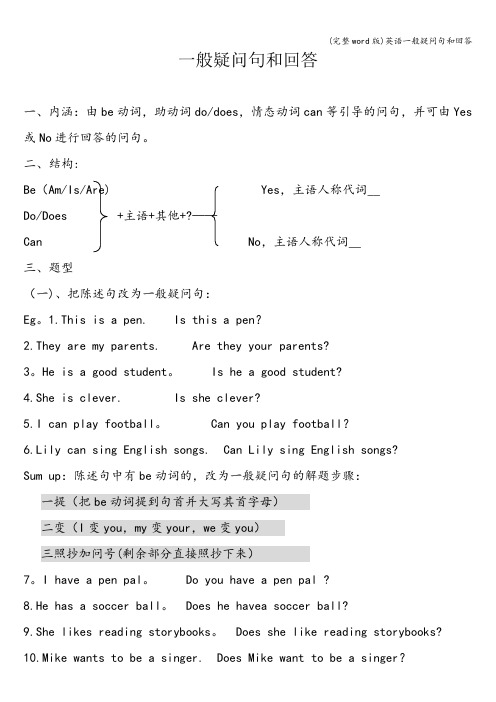
一般疑问句和回答一、内涵:由be动词,助动词do/does,情态动词can等引导的问句,并可由Yes 或No进行回答的问句。
二、结构:Be(Am/Is/Are) Yes,主语人称代词__Do/Does +主语+其他+?——Can No,主语人称代词__三、题型(一)、把陈述句改为一般疑问句:Eg。
1.This is a pen. Is this a pen?2.They are my parents. Are they your parents?3。
He is a good student。
Is he a good student?4.She is clever. Is she clever?5.I can play football。
Can you play football?6.Lily can sing English songs. Can Lily sing English songs?Sum up:陈述句中有be动词的,改为一般疑问句的解题步骤:一提(把be动词提到句首并大写其首字母)二变(I变you,my变your,we变you)三照抄加问号(剩余部分直接照抄下来)7。
I have a pen pal。
Do you have a pen pal ?8.He has a soccer ball。
Does he havea soccer ball?9.She likes reading storybooks。
Does she like reading storybooks?10.Mike wants to be a singer. Does Mike want to be a singer?Sum up:陈述句中有实意动词的(没有be/can),改为一般疑问句的解题步骤:一加(在句首加助动词Do/Does)二变(I变you,my变your,we变you)三照抄加问号(剩余部分直接照抄下来!实意动词要变回原型形式)练习:把下列句子改为一般疑问句.1。
(完整word版)小学英语肯定句语法

小学英语肯定句,否定句,一般疑问句,特殊疑问句详细讲解。
一、be动词:am, is, are
二、肯定句、否定句、一般疑问句和特殊疑问句定义
1.肯定句:表示肯定的意思, 即不含有否定词“不”。
比如:我是一个学生I am a student.
他去上学He goes to school.
2.否定句:表示否定的意思。
比如:我不是一个男孩。
I am not a boy
他不去上学He does not go to school.
3. 一般疑问句:回答为“是yes”或者“否no”的问句。
比如:你是一个学生吗?Are you a student?
你喜欢英语吗?Do you like English?
4. 特殊疑问句:回答不是“是yes”或者“否no”的问句,根据提问内容具体回答。
比如:现在几点了?What’s the time?
哪一支笔是你的?Which is your pen?
三、肯定句、否定句、一般疑问句和特殊疑问句的相互转换
肯定句变否定句:在am, is, are后面加上not,其余按顺序照抄。
肯定句变一般疑问句:把am, is, are提前放到句首并大写Am, Is, Are,其余照抄。
肯定句变特殊疑问句(就划线部分提问):分3步骤
第一步:先变一般疑问句,第二步:找合适的特殊疑问词代替划线部分第三步:特殊疑问词提前放到句首,并大写,其余按顺序照抄,省略划线部分。
注意:1.
如:Li ming 's not here today. Who's not here today? 今天谁没来?
2.划线部分不能在特殊疑问句中出现。
间。
(完整版)小学英语一般疑问句、否定句和特殊疑问(附习题)(可编辑修改word版)
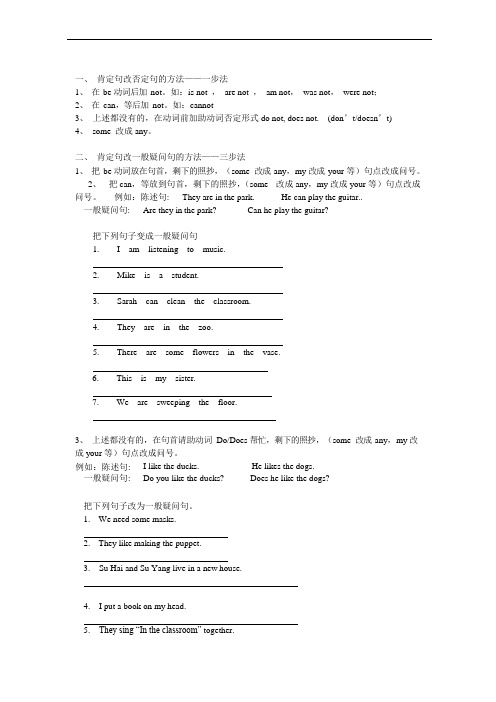
一、肯定句改否定句的方法——一步法1、在be 动词后加not。
如:is not ,are not ,am not,was not,were not;2、在can,等后加not。
如:cannot3、上述都没有的,在动词前加助动词否定形式do not, does not. (don’t/doesn’t)4、some 改成any。
二、肯定句改一般疑问句的方法——三步法1、把be 动词放在句首,剩下的照抄,(some 改成any,my 改成your 等)句点改成问号。
2、把can,等放到句首,剩下的照抄,(some 改成any,my 改成your 等)句点改成问号。
例如:陈述句: They are in the park. He can play the guitar..一般疑问句: Are they in the park? Can he play the guitar?把下列句子变成一般疑问句1. I am listening to music.2. Mike is a student.3. Sarah can clean the classroom.4. They are in the zoo.5. There are some flowers in the vase.6.This is my sister.7.We are sweeping the floor.3、上述都没有的,在句首请助动词Do/Does 帮忙,剩下的照抄,(some 改成any,my 改成your 等)句点改成问号。
例如:陈述句: I like the ducks. He likes the dogs.一般疑问句: Do you like the ducks? Does he like the dogs?把下列句子改为一般疑问句。
1.We need some masks.2.They like making the puppet.3.Su Hai and Su Yang live in a new house.4.I put a book on my head.5.They sing “In the classroom” together.6.We play basketball on Sundays.7.Tom likes listening to music三、肯定句改特殊疑问句的方法——四步法1、在一般疑问句的基础上,句首添加一个疑问词即可,可根据划线部分确定是什么疑问词。
(完整版)小学英语一般疑问句和特殊疑问句(附练习题)(可编辑修改word版)
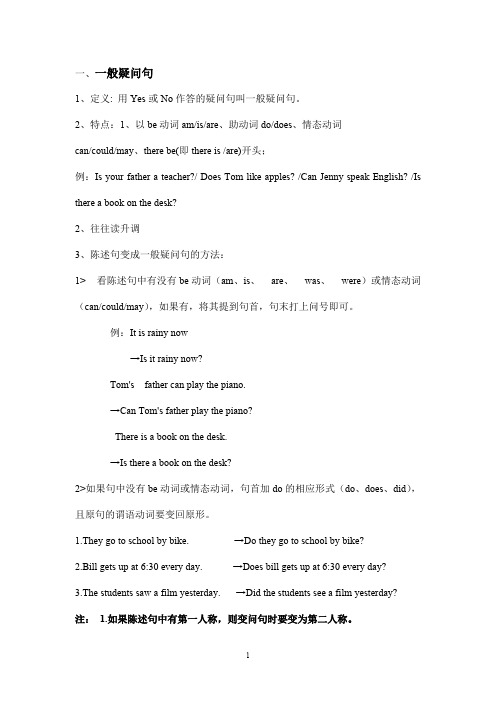
一、一般疑问句1、定义: 用Yes或No作答的疑问句叫一般疑问句。
2、特点:1、以be动词am/is/are、助动词do/does、情态动词can/could/may、there be(即there is /are)开头;例:Is your father a teacher?/ Does Tom like apples? /Can Jenny speak English? /Is there a book on the desk?2、往往读升调3、陈述句变成一般疑问句的方法:1> 看陈述句中有没有be动词(am、is、are、was、were)或情态动词(can/could/may),如果有,将其提到句首,句末打上问号即可。
例:It is rainy now→Is it rainy now?Tom's father can play the piano.→Can Tom's father play the piano?There is a book on the desk.→Is there a book on the desk?2>如果句中没有be动词或情态动词,句首加do的相应形式(do、does、did),且原句的谓语动词要变回原形。
1.They go to school by bike. →Do they go to school by bike?2.Bill gets up at 6:30 every day. →Does bill gets up at 6:30 every day?3.The students saw a film yesterday. →Did the students see a film yesterday?注: 1.如果陈述句中有第一人称,则变问句时要变为第二人称。
I usually have lunch at school. →Do you usually have lunch at school?2.如果陈述句中有some, 则变问句时往往要变成any 。
(完整word版)小学三年级英语课堂笔记

Unit 1 Hello I’m Monkey一.必背词汇:cat monkey duck dog panda bear pig rabbit bird mouse二.必背句型:1.Hello!I’m Kate。
你好!我是凯特。
2.What’s your name ?My name is Lisa .你叫什么名字?我叫丽萨。
3.Good morning! 早上好!上午好!4.Good afternoon! 下午好!5.Good evening ! 晚上好!6.Good night ! 晚安!7.Goodbye != Bye!=See you!再见!三.词形转化1.Hello 同义词Hi2. I’m完全形式I am3.I Be动词am4.My name’s=My name is1页四.句型转换(一)陈述句:I am Peter.否定句: I’m not Peter. 一般疑问句: Are you Peter?肯定回答:Yes. I am .否定回答:No,I’m not.划线处提问: What’s your name?(二)陈述句:My name is Miss Wu.否定句:My name is not Miss Wu.一般疑问句: Is your name Miss Wu?肯定回答:Yes. I is .否定回答:No,it isn’t.划线处提问: What’s your name?(三)I’m Mr Lin.=My name is Mr Lin.(四)Who are you?你是谁?(五) Good morning boy and girls!早上好孩子们!(六)Good night! Mum and Dad!爸爸妈妈,晚安!(七)Act like a monkey!扮演个猴子!五.Be 动词有三个,(我)是am,(你)是are,is用在“她”“他”“它”,其余人称都用are。
2页Unit 2 This is my pencil。
【推荐】小学英语语法:一般疑问句-优秀word范文 (2页)

【推荐】小学英语语法:一般疑问句-优秀word范文本文部分内容来自网络整理,本司不为其真实性负责,如有异议或侵权请及时联系,本司将立即删除!== 本文为word格式,下载后可方便编辑和修改! ==小学英语语法:一般疑问句1、 Did you read books ? 你读书了吗?Yes , I did .是的,我读过了。
No , I didn & rsquo ; t . 不,我没有读过。
2、 Is she quiet ? 她文静吗?No , she isn & rsquo ; t . She & rsquo ; s very active . 不,她不。
她很活跃。
Is she strict ? 她严格吗?Yes , she is , but she & rsquo ; s very kind .是的,她是,但是她很和蔼。
3、 Is this a teacher & rsquo ; s desk ? 这是一张讲台桌吗?Is it cold ? 冷吗?Is her birthdayin June ? 她的生日在六月吗?Is this yourT - shirt ? 这是你的 T 恤衫吗?Yes , it is . 是的。
No , it isn & rsquo ; t . / No , it & rsquo ; s not . 不,不是的。
4、 Can you make the bed ? 你会铺床吗?Can you use acomputer ? 你会使用电脑吗?Yes , I can . 是的,我会。
No , I can & rsquo ; t . 不,我不会。
(完整word版)小学英语一般疑问句练习题及答案
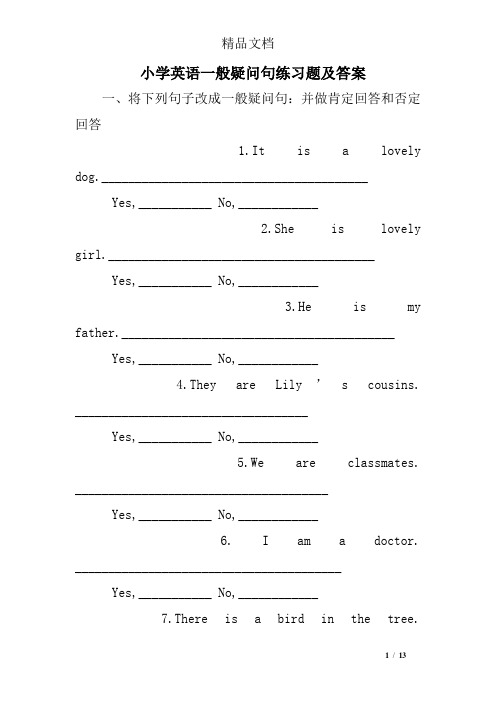
7.There is a bird in the tree.________________________________
Yes,___________ No,____________
8.There are many stars in the sky. ____________________________
Yes,___________ No,____________
有be的就be+not
没有Be的就在主语的后面+do not或does not
把肯定句改为疑问句就是有be的就把be提到前面来,
没有be的就在句首加do或 does
Eg: I am a teacher. ----I am She likes singing.------She like singing.
Yes,___________ No,____________
3.He is my father._________________________________________
Yes,___________ No,____________
4.They are Lily’s cousins. ___________________________________
Are they /you/ we late? Yes ,they/ you/we are./ No,they /you/we are not.
有be的就be+not
没有Be的就在主语的后面+do not或does not
把肯定句改为疑问句就是有be的就把be提到前面来,
没有be的就在句首加do或 does
(完整word版)小学英语语法时态讲解与归纳一般现在时,推荐文档

小学英语语法时态讲解与归纳~~ 一般现在时一. 意义:表示经常发生的事情,动作或存在的状态二. 构成及变化1.be动词的变化。
肯定句:主语+be(am ,is ,are)+其它。
如:I am a boy.我是一个男孩。
否定句:主语+ be + not +其它。
如:He is not a worker.他不是工人。
一般疑问句:Be +主语+其它。
如:-Are you a student?-Yes. I am. / No, I'm not.特殊疑问句:疑问词+一般疑问句。
如:Where is my bike?2. 行为动词的变化。
l、当主语为第一,二人称及复数时,助动词为do肯定句:主语+动词原形(+其它)。
如:We often play basketball after school.否定句:主语+ don't+动词原形(+其它)。
如:we don’t play basketball after school.一般疑问句:Do +主语+动词原形+其它?如:Do you often play basketball after school l?Yes, we do. / No, we don't.特殊疑问句:疑问词+以do开头的一般疑问句?如:What do you often do after school ?2、当主语为第三人称单数时,助动词为does肯定句:主语+动词三单式(+其它)。
如:He swims well.否定句:主语+ doesn’t+动词原形(+其它)。
如:He doesn’t swim well..一般疑问句:Does +主语+动词原形+其它。
如:Does he swim well ?Yes, he does. / No, he doesn't.特殊疑问句:疑问词+以does开头的一般疑问句?如:How does your father go to work?三.第三人称单数的动词变化规则(只有在第三人称为主语的肯定句中,动词才用三单式)(1)多数动词直接加s:runs gets likes collets takes plays climbs…….(2)结尾是s, x, sh, ch, o,前为辅音字母,结尾加es :watches goes does washes brushes(3)动词末尾y前为辅音:将y改为i加es:study→studies fly→flies carry→carries cry→cries但在y前如果为元音则直接加s:buys says四.时间标志:always总是, usually经常, often经常, sometimes 有时,every…每~一般现在时练习题(1)I.用下列单词的适当形式填空1.We often___________(play) in the playground.2.He _________(get) up at six o’clock.3.__________you _________(brush) your teeth everymorning?4.What________________(do) heusually________________(do) after school?5.Danny ________________(study) English, Chinese,maths, science and Art at school.6.Mike sometimes __________(go) to the park with hissister.7.At eight at night, she __________(watch) TV with hisparents.8.________ Mike________(read) English every day?Ⅱ单项选择。
完整word版,小学三年级英语语法

小学三年级英语语法(一)神态动词cancan 在英语中有一个特别的名字,叫做神态动词,表示“能够”, “会”, “能力”后边要随着表示动作的动词。
没有时态和人称的变化。
表示不可以做什么的时候或许缩写为 can’ t。
问他人“能吗?”要把 can 放在句子前方,后边加上,首字母要大写not 为 can not, ,句尾别忘加上问号。
例句:—I can swing .I can draw.— She can jump.He can play .— We can touch .They can run.— I can’ t sing.You can’t see.— She can’ t dance.He can’ t hear a car.— We can’ t hear an aeroplane.— Can you hear a dog?Can he hear a bus?— Can Lucy write ? Can you do it?将下边各组词构成句子1.________________________(an,aeroplane,hear,Lucy,can )2.____________________________ (not,he ,dance,can )3.____________________________? (you,can ,see,what )4.____________________________(can ,see ,not ,we ,you)5._____________________________. (I ,can ,help ,you )6._____________________________? (I,can ,do,what)7._____________________________? (you ,can ,hear me)8._____________________________? (you ,can ,dance)答案: 1. Lucy can hear an aeroplane. 2. He can not /can’t dance.3. What can you see?4. We can not /can ’ t see you5. I can help you.6. What can I do?7. Can you hear me? 8. Can you dance?(二 )人称代词所属格. 人称代词表人称主格 be 动词及其所有格, have/has 及其助动词及其否宾格否认形式形容性物否认形式定形式主代词第一人称我I am/am not my have/haven ’t do/don ’t me 单你you are/aren ’t your have/haven ’t do/don ’t you 第二人称数他he is/isn ’t his has/hasn ’t does/doesn ’t him 第三人称她she is/isn ’t her has/hasn ’t does/doesn ’t her它it is/isn ’t its has/hasn ’t does/doesn ’t it人名人名is/isn ’t人名’shas/hasn ’t does/doesn ’t人名第一人称我们复第二人称你们数第三人称他们,她们,它们we are/aren ’t our have/haven ’t do/don ’t us you are/aren ’t your have/haven ’t do/don ’t you they are/aren ’t their have/haven ’t do/don ’t them注意:主格作主语,此中 she 指带代国家 ,it 可指代天气时间等。
(完整word版)一般疑问句的回答

一般疑问句的回答英语陈述句变一般疑问句口诀:一般疑问句,变换并不难。
先要看动词,情况分两种。
①见了be和can,快快提上前。
be动词是否变is/ am/ are由后面的来决定。
can的变化最简单,所有人称都用can。
②动词为实义,do和does上前线。
单三人称用does,动词一定要还原。
其他人称都用do。
第一人称变第二。
原句首字母变小写,切记句号变问号!1、肯定回答:Yes , 主语+ 一般疑问句开头的那个单词。
例如:Is Tom a student?------ Yes , he is .2、否定回答:No , 主语+一般疑问句开头那个单词和not的缩写形式。
例如:Is Tom a student?---- No , he isn`t.注意:如果主语是男性,就用he,女性就用she.如果是复数,有I在里面,就用we,有you 在里面,就用you,如果I和you 都不在里面,就用they.问句的主语是you时,回答是用I或we.人称代词:我,我,我_____ _____ ______ 你,你,你(们)_____ _____ ______男他,男他_____ _____ ______ 女她,女她_____ _____ ______动物它,动物它_____ _____ ______ 我们,我们_____ _____ ______他们,他们_____ _____ ______人称代词主格:I we you he she they 宾格:me us you him her them物主代词形容词性物主代词: my our your his her their 名词性物主代词:mine ours yours his hers theirs认识Be动词:(am, is, are)口诀:Be大侠,会变化,I后am,you后are。
单数后面变is,复数后面变成are。
我(I)用am , 你(you)用am,is跟着他(he),她(she),它(it)。
一般疑问句

用 do 问 (I, they)
• I often watch TV on Sundays. →Do you often watch TV on Sundays? Yes, I do. No, I don't.
I我
1.I like apples. Do you like apples?
2.I like to eat Do you like to eat
Yes, they do. No, they don't.
need 需要
• need to do
I need to do some shopping(购物). 我需要去一些买东西。
2. I need to read books.
我需要看书。
basketball 篮球 listen to music 听音乐
Is that your pencil ? 3、It is my pen.
Is it your pen ? 4、She is six years old(六岁).
Is she six years old? 5、He is a boy. (男孩)
Is he a boy?
Is that a peach?
1.That is a peach.
Is it your ruler?
2.It is my ruler.
Is that an apple?
3.That’s an apple.
Is this your bag?
4.This is your bag.
Is she your teacher ? 5.She is my teacher.
一般疑问句
回答为“是yes”或者“否no”的 问句。
【精编范文】英语疑问句-实用word文档 (2页)

【精编范文】英语疑问句-实用word文档
本文部分内容来自网络整理,本司不为其真实性负责,如有异议或侵权请及时联系,本司将立即删除!
== 本文为word格式,下载后可方便编辑和修改! ==
英语疑问句
英语疑问句在英语语法中是一大句型,其中包括一般疑问句,选择疑问句和特殊疑问句三种:
1) 一般疑问句
a ) Is Jim a student ?
b ) Can I help you ?
c ) Does she like sala
d ?
d ) Do they watch TV ?
e ) Is she reading ?
肯定回答:
a ) Yes , he is .
b ) Yes , you can .
c ) Yes , she does .
d ) Yes , they do .
e ) Yes , she is .
否定回答:
a ) No , he isn & rsquo ; t .
b ) No , you can & rsquo ; t .
c ) No , she doesn & rsquo ; t .
d ) No , they don & rsquo ; t .
e ) No , she isn & rsquo ; t .。
(完整word版)疑问句大全
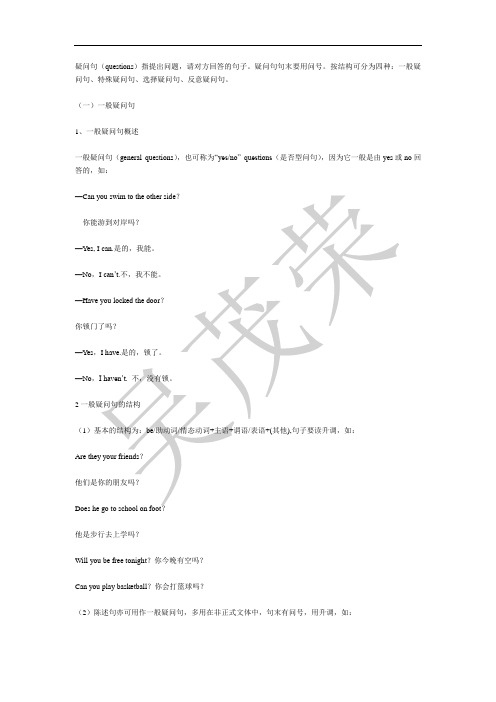
(一)一般疑问句
1、一般疑问句概述
一般疑问句(general questions),也可称为“yes/no” questions(是否型问句),因为它一般是由yes或no回答的,如:
—Can you swim to the other side?
你能游到对岸吗?
—Yes, I can.是的,我能。
—No,I can’t.不,我不能。
—Have you locked the door?
你锁门了吗?
—Yes,I have.是的,锁了。
—No,I haven’t.不,没有锁。
2一般疑问句的结构
(2)陈述句亦可用作一般疑问句,多用在非正式文体中,句末有问号,用升调,如:
Somebody is with you?
有人和你一起吗?
He didn’t finish the work?
他没有做完活吗?
You are fresh from America,I suppose?
我猜,你刚从美国回来吧?
1)否定疑问句常常带有惊异、赞叹或责难等语气,如:
Haven’t you read the newspaper?
你没读过这份报纸呀?
Won’t he come?他不来了?
2)否定疑问句有时暗示提问者期待着肯定的回答,如:
Shouldn’t we start now?
我们现在是不是该动身了?
Wasn’t it an interesting film?
(1)基本的结构为:be/助动词/情态动词+主语+谓语/表语+(其他),句子要读升调,如:
(完整word版)一般疑问句讲解及练习

一般疑问句在英语学习中,一般疑问句的转换及回答是经常碰到的问题,现在我们就来探讨一下一般疑问句的问题。
一什么是一般疑问句以be动词(am is are),助动词(do does have),情态动词(can)开头的句子,用Yes 或No 作答。
读升调!二陈述句变一般疑问句遵循1找2接1找看句中有没有be动词(am is are),助动词(do does have has),情态动词(can),如果有,直接将其放句首,句末打上问号。
Eg: He is three years old 。
(变一般疑问句)Is he three years old ?They are good friends .(变一般疑问句)Are they good friends ?She can swim and draw。
(变一般疑问句)Can she swim and draw ?2借如果句中有没有be动词(am is are),助动词(do does have has),情态动词(can),则根据谓语动词的形式借助do 或does放句首。
具体方法:如果谓语动词是原型,则借助do 放句首;如果谓语动词是第三人称单数形式,则借助does 放句首,原句的谓语动词要变回原型。
Eg:They go to school by bike .Do they go to school by bike ?He goes to school by bike .Does he go to school by bike ?3 如果句中有实意动词have/ has ,且表示有时,可以“借”也可以“找”,即可以借do/does放句首,也可以直接把have/ has放句首。
Eg:They have ten apples 。
1)Do they have ten apples ? Yes , they do . No , they don’t 2)Have they ten apples ? Yes , they have .No , they haven’t.陈述句变一般疑问句注意事项:1如果陈述句中有第一人称,变一般疑问句时一定要变成第二人称。
(完整word版)陈述句变一般疑问句讲解练习及答案
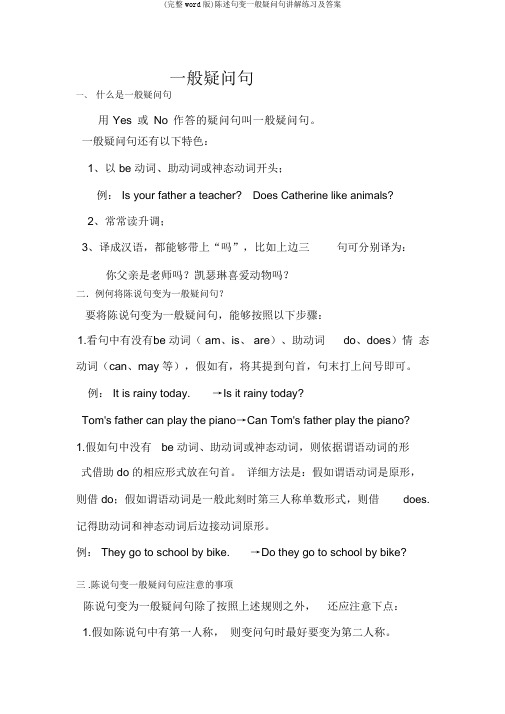
一般疑问句一、什么是一般疑问句用Yes 或No 作答的疑问句叫一般疑问句。
一般疑问句还有以下特色:1、以 be 动词、助动词或神态动词开头;例: Is your father a teacher?Does Catherine like animals?2、常常读升调;3、译成汉语,都能够带上“吗”,比如上边三句可分别译为:你父亲是老师吗?凯瑟琳喜爱动物吗?二.例何将陈说句变为一般疑问句?要将陈说句变为一般疑问句,能够按照以下步骤:1.看句中有没有b e 动词( am、is、 are)、助动词do、does)情态动词(can、may 等),假如有,将其提到句首,句末打上问号即可。
例: It is rainy today.→Is it rainy today?Tom's father can play the piano→Can Tom's father play the piano? 1.假如句中没有be 动词、助动词或神态动词,则依据谓语动词的形式借助 do 的相应形式放在句首。
详细方法是:假如谓语动词是原形,则借 do;假如谓语动词是一般此刻时第三人称单数形式,则借does.记得助动词和神态动词后边接动词原形。
例: They go to school by bike.→Do they go to school by bike?三 .陈说句变一般疑问句应注意的事项陈说句变为一般疑问句除了按照上述规则之外,还应注意下点:1.假如陈说句中有第一人称,则变问句时最好要变为第二人称。
I usually have lunch at school→Do you usually have lunch at school?My father is playing soccer.→Is your father playing soccer?2.假如陈说句中有some,则变问句时常常要变为any 。
(完整word版)一般疑问句和特殊疑问句练习题
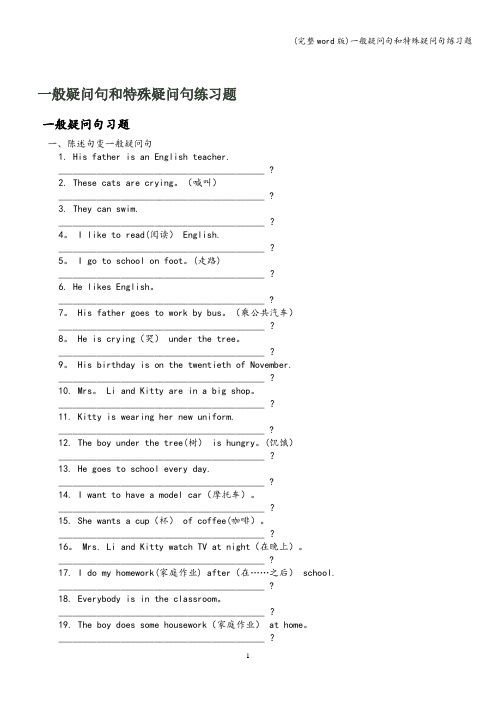
一般疑问句和特殊疑问句练习题一般疑问句习题一、陈述句变一般疑问句1. His father is an English teacher.___________________________________________ ?2. These cats are crying。
(喊叫)___________________________________________ ?3. They can swim.___________________________________________ ?4。
I like to read(阅读) English.___________________________________________ ?5。
I go to school on foot。
(走路)___________________________________________ ?6. He likes English。
___________________________________________ ?7。
His father goes to work by bus。
(乘公共汽车)___________________________________________ ?8。
He is crying(哭) under the tree。
___________________________________________ ?9。
His birthday is on the twentieth of November.___________________________________________ ?10. Mrs。
Li and Kitty are in a big shop。
___________________________________________ ?11. Kitty is wearing her new uniform.___________________________________________ ?12. The boy under the tree(树) is hungry。
(完整word版)英语各种时态的概念和句型结构1
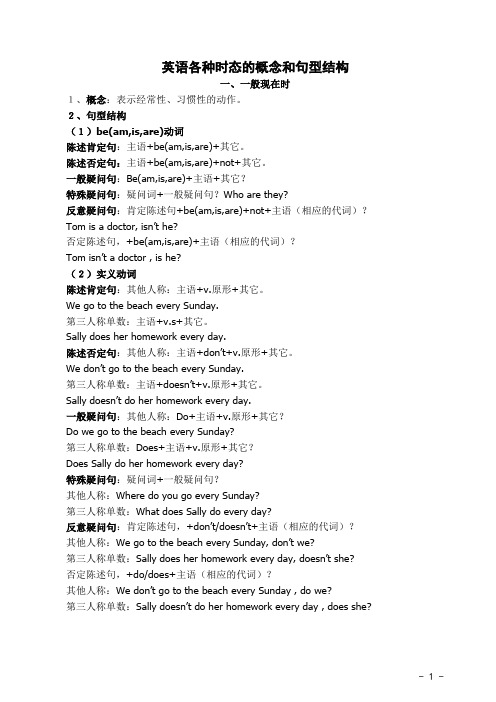
英语各种时态的概念和句型结构一、一般现在时1、概念:表示经常性、习惯性的动作。
2、句型结构(1)be(am,is,are)动词陈述肯定句:主语+be(am,is,are)+其它。
陈述否定句:主语+be(am,is,are)+not+其它。
一般疑问句:Be(am,is,are)+主语+其它?特殊疑问句:疑问词+一般疑问句?Who are they?反意疑问句:肯定陈述句+be(am,is,are)+not+主语(相应的代词)?Tom is a doctor, isn’t he?否定陈述句,+be(am,is,are)+主语(相应的代词)?Tom isn’t a doctor , is he?(2)实义动词陈述肯定句:其他人称:主语+v.原形+其它。
We go to the beach every Sunday.第三人称单数:主语+v.s+其它。
Sally does her homework every day.陈述否定句:其他人称:主语+don’t+v.原形+其它。
We don’t go to the beach every Sunday.第三人称单数:主语+doesn’t+v.原形+其它。
Sally doesn’t do her homework every day.一般疑问句:其他人称:Do+主语+v.原形+其它?Do we go to the beach every Sunday?第三人称单数:Does+主语+v.原形+其它?Does Sally do her homework every day?特殊疑问句:疑问词+一般疑问句?其他人称:Where do you go every Sunday?第三人称单数:What does Sally do every day?反意疑问句:肯定陈述句,+don’t/doesn’t+主语(相应的代词)?其他人称:We go to the beach every Sunday, don’t we?第三人称单数:Sally does her homework every day, doesn’t she?否定陈述句,+do/does+主语(相应的代词)?其他人称:We don’t go to the beach every Sunday , do we?第三人称单数:Sally doesn’t do her homework every day , does she?二、一般过去时1、概念:表示过去某个时间发生的动作或存在的状态。
一般疑问句(三年级)[2]
![一般疑问句(三年级)[2]](https://img.taocdn.com/s3/m/7f1c920d4afe04a1b171de37.png)
一般疑问句(三年级)(word版可编辑修改)编辑整理:尊敬的读者朋友们:这里是精品文档编辑中心,本文档内容是由我和我的同事精心编辑整理后发布的,发布之前我们对文中内容进行仔细校对,但是难免会有疏漏的地方,但是任然希望(一般疑问句(三年级)(word版可编辑修改))的内容能够给您的工作和学习带来便利。
同时也真诚的希望收到您的建议和反馈,这将是我们进步的源泉,前进的动力。
本文可编辑可修改,如果觉得对您有帮助请收藏以便随时查阅,最后祝您生活愉快业绩进步,以下为一般疑问句(三年级)(word版可编辑修改)的全部内容。
一般疑问句1.有BE(am/is/are)动词,陈述句变一般疑问句。
I am a student. =〉 Are you a student?(注意:I am和We are 变Are you/“。
"换“?”)(这里不知道你们是不是用Am I?)I am a good student。
=>I am a tall and nice boy。
=>We are Chinese students。
=>They are in class 5。
=>Alice is a girl。
=> Is Alice a girl?(注意:Is 提前/原来大写人名地名等任然大写)Tom is a student。
=>He is a football player. =>Miss Yin is a nice girl. =>She is a English teacher. =>This is my pencil。
=> Is this your pencil? (注意:my和our 变成your)That is my pencil-box。
=〉This is our classroom。
=>Miss Yin is my friend。
- 1、下载文档前请自行甄别文档内容的完整性,平台不提供额外的编辑、内容补充、找答案等附加服务。
- 2、"仅部分预览"的文档,不可在线预览部分如存在完整性等问题,可反馈申请退款(可完整预览的文档不适用该条件!)。
- 3、如文档侵犯您的权益,请联系客服反馈,我们会尽快为您处理(人工客服工作时间:9:00-18:30)。
一般疑问句(三年级)
一、如果句子中有“is”变一般疑问句把“is”调到句首,采用“一调二改三
问号”,这时候“Is”要大写。
1. This is my father .
Is this your father ? ( Yes , it is . )
2. It’s a black dog .
Is it a black dog ? ( No , it isn’t .)
3. That is a yellow banana .
Is this a yellow banana ? ( Yes , it is . )
4. She is a nurse . (她是一名护士。
)
Is she a nurse ? (她是一名护士吗?) (Yes , she is .)
5. He is a policeman . (他是一名警察。
)
Is he a policeman ? (他是一名警察吗?) ( No , he isn’t .)
一般疑问句回答时用Y es/ No 回答。
将下列句子变成一般疑问句,注意看上面的例句。
6. This is a desk . ( ___________________________________?)
7. That is a chair . ( ____________________________________? )
8. He is a farmer .( ____________________________________?)
9. She is a doctor .( ____________________________________?)
10. He’s a teacher . ( ____________________________________?)
11. She’s a driver .( ____________________________________?)
12. That’s a cat . ( _____________________________________?)
13. It’s a red car .( ____________________________________?)
二、按照要求回答问题,一线一词。
1. Is this a yellow pen ? (做肯定回答) _____ , ______ _____ .
2. Is that a monster ? (做否定回答) ______ , ________ _____ .
3. Is it a cake ? (做肯定回答) ________ , _______ ________ .
4. Is this a dog ? (做否定回答) _______ , _______ ________ .
5. Is that a pen ? (做否定回答) _______ , _______ ________ .
6. Is she a docror ? (做肯定回答) ______ , ______ _________ .
7. Is your mother a nurse ? ( 做否定回答)
_______ , ________ ________ . She’s a nurse .。
